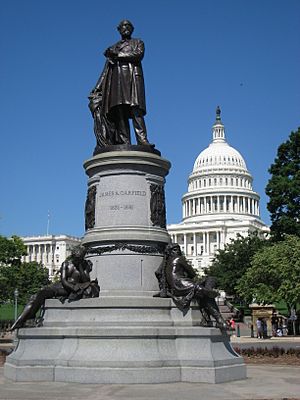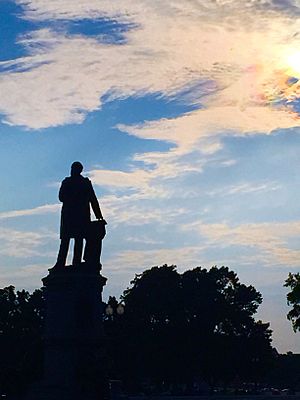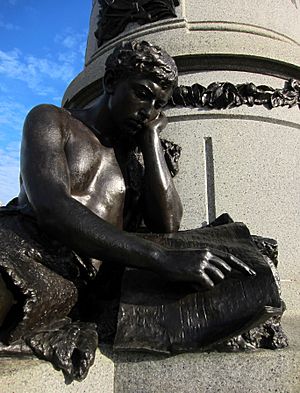James A. Garfield Monument facts for kids
The James A. Garfield Monument is a special memorial located on the grounds of the United States Capitol in Washington, D.C.. It honors James A. Garfield, who was the President of the United States. He was elected in 1880 but sadly passed away in 1881, just four months into his term.
The monument was created by the talented sculptor John Quincy Adams Ward and was officially shown to the public on May 12, 1887. It is a great example of American Beaux-Arts style, which is a type of art and building design. Today, it stands near the Capitol Reflecting Pool as part of a group of three sculptures, including the Peace Monument and the Ulysses S. Grant Memorial.
Contents
About the Garfield Monument
This monument was built to remember President Garfield and his service to the country. It is a significant landmark in Washington, D.C., showing respect for his life and achievements.
Who Was James A. Garfield?
James A. Garfield was an important figure in American history. Before becoming president, he was a Major-General during the American Civil War. He also served as a Member of Congress and a Senator. He was elected as the 20th President of the United States in 1880. Sadly, he was assassinated in 1881.
How the Monument Was Built
The idea for the monument came from the Society of the Army of the Cumberland. Garfield had been a member of this group. They started raising money for the monument in 1884.
To get the money, the Society held a special event called The Garfield Monument Fair. This fair took place in 1882 inside the Capitol's Rotunda and National Statuary Hall. The U.S. Congress also helped by giving money from the sale of old cannons. In 1884, Congress provided more funds for the monument's base. The monument officially became part of the Capitol Grounds in 1975.
What the Monument Shows
The monument features a large statue of James A. Garfield. Around the base of the statue, there are three other figures. These figures are called allegorical figures, meaning they represent ideas or qualities. They show different important parts of Garfield's life:
- The Student: This figure reminds us that Garfield was an educator before he became a politician.
- The Warrior: This figure honors his time serving in the military during the Civil War.
- The Statesman: This figure represents his career as a public servant, including his time in Congress and as President.
See also
 In Spanish: Monumento a James A. Garfield para niños
In Spanish: Monumento a James A. Garfield para niños
 | Aaron Henry |
 | T. R. M. Howard |
 | Jesse Jackson |




